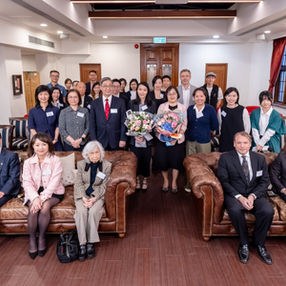HKU launches Institute of Data Science with HK$150 million donation from The Musketeers Foundation
- Jan 7, 2022
- 4 min read

Dedication Ceremony of HKU Musketeers Foundation Institute of Data Science was held on Jan 5 2022.
Jan 2022
The Musketeers Education and Culture Charitable Foundation (the Foundation) donated HK$150 million to The University of Hong Kong (HKU) to establish the “Musketeers Foundation Institute of Data Science” (the Institute), marking a major milestone in the University’s innovation and technology development. The Institute will be anchored at the Tech Landmark, headquarters of the HKU InnoTech initiative.
The Foundation was co-founded by Messrs Stanley Chu (BSc 1973), Dr Lawrence Fung (BSocSc 1972; HonDSocSc 2010) and Leong Ka-chai in 2008. It is a non-profit-making charity committed to promoting creativity in education, arts and culture. The three Messers are the long-term supporters of HKU and have donated to various University’s initiatives throughout the years.
Mr Stanley Chu, one of the founders of The Musketeers Education and Culture Charitable Foundation, said, “We named our foundation the Musketeers and 「同心」in Chinese in honour of our long partnership. What we treasure most is the sharing of the same life values. The foundation aims to help the younger generations find a meaningful future. We believe technology will play an important role in the future. With all the experts and collaborations across disciplines, we think the Institute can help solve many world problems.”
HKU President and Vice-Chancellor Professor Xiang Zhang remarked, “HKU is deeply grateful to the Musketeers Foundation’s continuous support to the University, and most of all, the trust they place in our research excellence. The three Musketeers believe in the future of Hong Kong, and they want to give back. They want to build the future for our young people. The HKU Musketeers Foundation Institute of Data Science will make a positive impact in our society and be the engine for our future.”
Professor Max Shen, Vice-President and Pro-Vice-Chancellor (Research) and Director of The Institute said, “The Institute will be a world-class data science hub, based in Hong Kong and connected to the University’s Shenzhen Campus in the Greater Bay Area. The three areas of Fundamental Data Science, Explainable AI and Human-Machine Interplays, and Smart Society will shape the research focus of the Institute in the coming years.”
The Institute will be the command centre based at the HKU Main Campus with branches, satellite centres, labs, and institutes in the Mainland, in particular in the Greater Bay Area and the Lok Ma Chau Loop, to facilitate collaborations with local partners in industry, business, government sectors and other research institutions where data is collected.
The Institute has recruited young talents and world leaders (video) to form the core team of data scientists and the members include:
Dr Chao Huang, Assistant Professor, Department of Computer Science
Dr Huang Wenjie, Research Assistant Professor, Department of Industrial and Manufacturing Systems Engineering
Dr Yue Xie, Research Assistant Professor, Department of Mathematics
Dr Tao Yu, Assistant Professor, Department of Computer Science
The data scientists team will collaborate with Frontier Research in Data Science (video) across the disciplines, including:
Professor Herman Cappelen, Chair Professor, Department of Philosophy
Professor Chen Lin, Chair of Finance
Professor Ian Wong, Head of Department of Pharmacology and Pharmacy
Dr Shi Hui Feng, Assistant Professor, Academic Unit of Human Communication, Development, and Information Sciences
In addition, The Institute benefits greatly from the advice of internationally eminent experts and scholars who form the Advisory Board. Members include:
Professor Pieter Abbeel Director of Berkeley Robot Learning Lab Co-Director of Berkeley Artificial Intelligence Lab
Professor Lawrence Carin Provost, King Abdullah University of Science and Technology Former Vice President for Research, Duke University
Professor Laurent EI Ghaoui Electrical Engineering and Computer Science, UC Berkeley
Harry Shum Founder and Chairman, International Digital Economy Academy
Martin Wainwright Chancellor’s Professor of Statistics and Electrical Engineering and Computer Sciences, UC Berkeley
The Institute is committed to excelling in critical strategic research directions including:
1. Fundamental Data Science
The Institute will develop novel methodologies used to analyse large volumes of data, with the goal of finding new patterns, associations, or correlations, leading to hypothesis formation and new scientific discoveries and results. A core team of data scientists specialising in computer science, mathematics, and statistics as well as industrial engineering will work together to form the “brain’’ of The Institute. With the capacity of these core data scientists, strategic research clusters will be set up across disciplines by leveraging the strengths of different Faculties to address complex and data-driven problems.
2. Explainable AI and Human-Machine Interplays
AI is everywhere in our daily lives, permeating a broad range of sectors including healthcare, education, manufacturing, law, engineering, and finance. The use of AI-enabled systems helps in making predictions and decisions that have profound effects on peoples’ lives and wellbeing.
Why does an AI system make a specific prediction or decision? Why should we trust the AI system? How can the AI system correct errors that arise? Explainable AI aims to address how the black box decisions of AI systems are made, helping us to understand the steps and models involved in making decisions. This will ensure that when an AI system makes a mistake in a real-life situation, we can identify its source and prevent future mistakes.
3. Smart society
Hong Kong and the Greater Bay Area are very well placed to conduct smart society research. Current data science research by HKU’s Faculties of Architecture, Dentistry, Education, Engineering, Medicine, and Social Sciences could be leveraged by utilising and integrating their data to provide a healthy and sustainable society ecosystem by integrating information and communication technology (ICT), the Internet of things (IoT), and citizen participation. The focused areas we aim to develop include (1) sustainable development: digital economies, societies, cities; (2) resilience and response to 21st-century challenges to complex societies; and 3) data systems and strategies for smart societies: hard and soft infrastructures.







